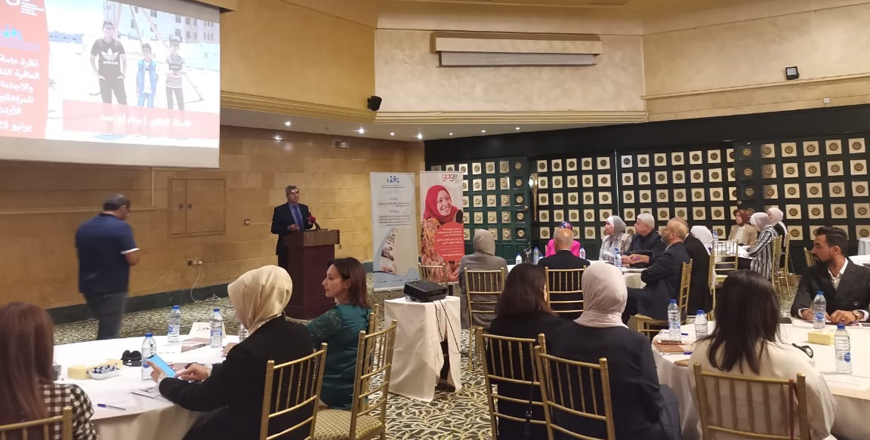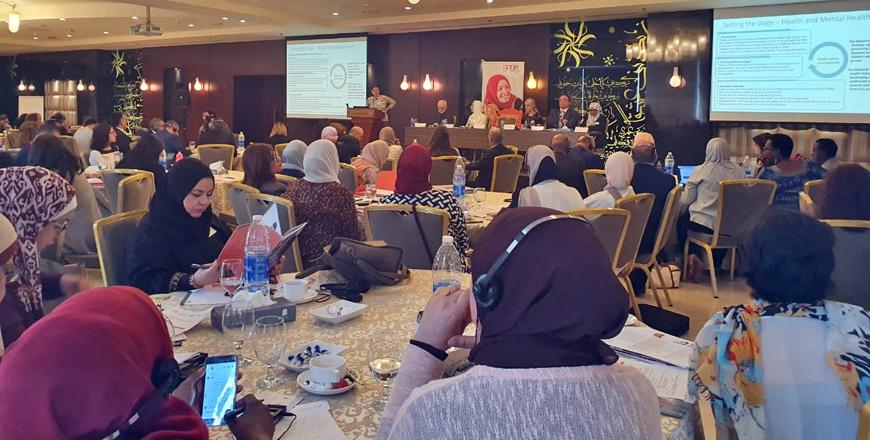You are here
Jordan’s most vulnerable youth in need of formal, informal psychosocial support, says policy brief
By Rana Husseini - Jun 13,2023 - Last updated at Jun 13,2023

Guests during the launch of a policy brief by the National Council for Family Affairs in cooperation with the Gender and Adolescence: Global Evidence research programme (Petra photo)
AMMAN — Adolescents living in Jordan need stepped-up psychosocial support — both formally and informally — if they are to thrive, according to the findings of a local policy brief.
The policy brief, was launched on Monday by the National Council for Family Affairs in cooperation with the Gender and Adolescence: Global Evidence (GAGE) research programme.
“Although most adolescents appear to be resilient and reasonably well-supported, a large minority of girls and boys are emotionally distressed and exhibiting symptoms of depression and anxiety,” said the policy brief.
Despite Jordan’s considerable progress in terms of extending psychosocial support services since its selection to implement the World Health Organisation’s Mental Health Gap Action Programme, services remain extremely limited, the brief said.
“Only a small minority of primary health clinics offer integrated mental health services, partly because there are too few mental health care practitioners,” the brief stated.
Shortages are exacerbated by Jordan’s continued reliance on specialists, such as psychiatrists and psychologists, rather than on lay health workers and the development of community programmes that support individuals and families, the brief said.
GAGE’s Jordan research was conducted among around 4,000 adolescents in the Kingdom, most of whom are non-Jordanians, according to the NCFA Secretary General Mohammad Miqdadi.
“It is comprised of girls and boys from vulnerable Jordanian communities, mostly from the refugee camps, who either live in Jordanian host communities, formal refugee camps or informal tented settlements,” Miqdadi told The Jordan Times.
The sample covers two age cohorts: Younger adolescents, aged 10-12, and older adolescents aged 15-17 at the time of baseline data collection (late 2018 and early 2019), according to Miqdadi.
The policy paper aimed to contribute to the national dialogue by strengthening the base of evidence regarding the psychological well-being of adolescents in Jordan, Miqdadi said.
“It also aims to explore the factors that lead to the adolescent’s emotional distress so that it would be a starting point for building future plans and implementing programmes that ensures psychological safety for them,” he added.
Also addressing the gathering, Director of GAGE Nicole Jones said that in order to address the mental health challenges facing adolescents, “it is important to invest heavily in multi-sectoral and multi-form strategies to address the main determinants of mental well-being”.
That is why it is of the utmost importance to work on expanding social protection programmes as well as education and skills-building programmes for youth and adolescents, Jones added, also noting the need “to invest in combating violence against adolescents, including child marriages for those under the age of 18”.
The policy brief listed several recommendations, including providing parenting education courses that contain non-violent discipline strategies, techniques for fostering open parent-child communication and ways that parents can help their children become emotionally resilient.
Another recommendation focused on scaling up adolescent-focused programming by introducing young people to safe spaces where they can interact with friends and caring adults, learn about their rights and how to report violence, discuss the ways that gender norms shape their daily lives and future plans and develop coping and broader life skills.
In addition, the policy brief recommended stepping up teacher training by introducing courses that aim to improve the quality of education, reduce violent discipline, improve teachers’ ability to identify adolescents most in need of intervention and strengthen teachers’ capacity to foster social inclusion.
Related Articles
AMMAN — The Gender and Adolescence: Global Evidence Programme (GAGE), an international longitudinal research programme funded by UK aid and
AMMAN — Under the patronage of HRH Princes Muna, a conference focusing on Italian mental healthcare models as well as reforming mental healt
AMMAN — Exploring adolescent experiences amongst the most vulnerable children and adolescents in Jordan from refugee camps, informal tented
















